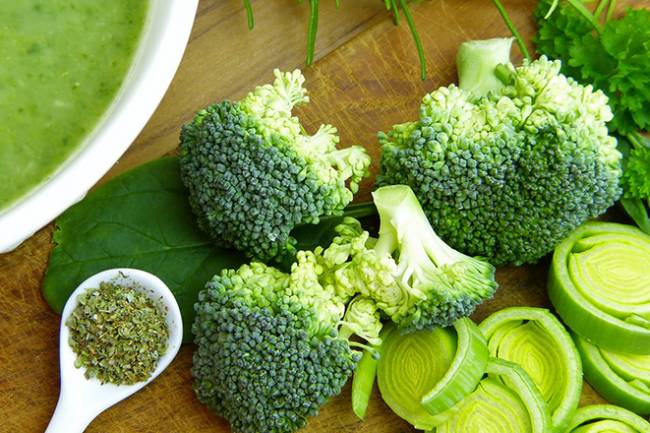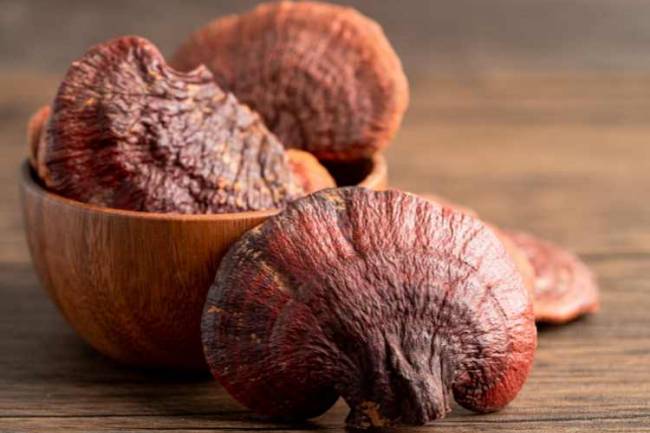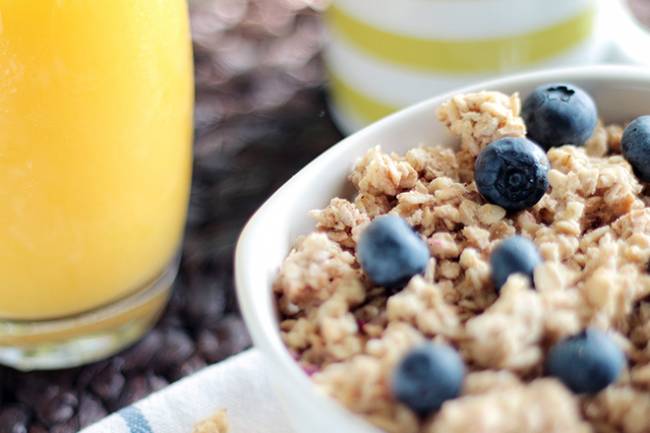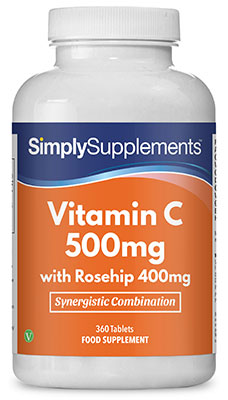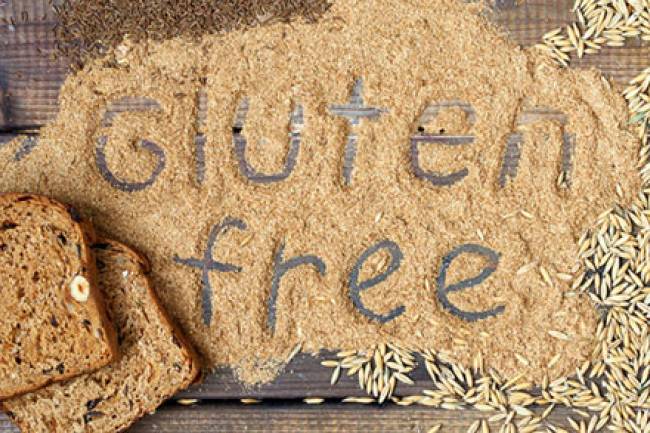Top Tips for Getting Rid of Congestion

Congestion is an all too common symptom that is related to a variety of different illnesses and stimuli that range in severity. As annoying as it can be to feel congested throughout the day, luckily you don't have to sit and suffer when you start to feel stuffy.
But before we can start to help relieve congestion, we first need to know what it is and how it's caused.
What Is Congestion?
Congestion, in the most basic terms, is the build-up of mucus and/or phlegm in the nasal or breathing passages. This build-up reduces the size of these passages, making it harder for you to breathe properly, which can limit or interfere with oxygen intake.
What are Mucus and Phlegm?
The production of mucus and phlegm is a direct response by your body to combat infections, bacteria, viruses or other harmful chemicals and substances that make their way into your body. These two slimy creations contain different antiseptic enzymes, immunoglobins and glycoproteins, as well as water and salts to produce the viscous consistency that makes them so notorious.
They are produced by mucous cells, which you can find clustered in small glands throughout almost the entire lining of the whole digestive system. These glands also line the inside of your sinuses and breathing passages and help to trap or catch the previously mentioned contaminants before they can make their way deeper into the body and cause further harm.
Mucus and phlegm, once they catch these harmful toxins can then be swallowed and digested by the acids found in the stomach, or blown or coughed out of your nose and mouth.
Causes of Congestion
Since congestion is a relatively common symptom, unfortunately there are a variety of different illnesses and reactions that can cause you to become congested. These include:
- Allergies to things like dust and animal hair
- Hay fever
- Irritants or chemicals in your surrounding environment
- Sinus infections
- Respiratory infections like colds and flu
- A deviated septum (bone and cartilage in the nasal cavity that restricts airflow)
- Nasal polyps (growths within the nasal passages and sinuses)
How to Relieve Congestion
Thankfully, despite the common occurrence of congestion, as well as its many causes, there are plenty of things you can try to help relieve it. Give these following suggestions a try and see if they help.
Inhale Steam from a Bowl of Hot Water
One of the most common remedies you'll find suggested is to inhale the steam from a bowl of hot water. Steam helps to moisten the lining of the nasal passages, which can help to dislodge and loosen mucus build-up, making it easier for you to clear away mucus and phlegm.
Just be careful not to use boiling water, because you can still suffer burns to your nasal passages if the water is too hot. Now if the severity of your congestion means you need an extra bit of help, there are a variety of different oils and crystals that you can add to the hot water that possess decongestant properties to provide more potent support. Popular additions include:
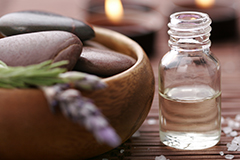 Menthol – Menthol is a compound that is most commonly found in things like peppermint, which itself can provide a variety of different digestive health benefits.
Menthol – Menthol is a compound that is most commonly found in things like peppermint, which itself can provide a variety of different digestive health benefits.
Menthol has the ability to trigger cold-sensitive receptors in the body, which is what helps to give mints their cool sensation if they are ingested or inhaled. This reaction is what makes adding menthol crystals to hot water ideally suited to help get rid of congestion. By stimulating receptors in the nasal passages, the addition of menthol crystals may be able to help provide more powerful decongestant support.
Eucalyptus – Eucalyptus possesses anti-bacterial, anti-fungal, anti-inflammatory and decongestant properties which can be utilised in oil form to help get rid of congestion. Eucalyptus oil also produces a refreshing, cooling effect similar to menthol that can stimulate your nasal passages, helping to clear them of mucus and phlegm.
Use a Saline Nasal Spray
Saline sprays can either be purchased at most supermarkets, or made yourself using half a tablespoon of salt in a litre of boiling water. Constant coughing or blowing of your nose can cause the nasal passages to become dehydrated or irritated, which may further exacerbate mucus production.
The purpose of a saline spray is to help clear your passages whilst also moisturising them. These solutions are also beneficial because they can help clear allergens, irritants or dust from the nostrils and inside of your nose which may have been a primary cause of your congestion in the first place.
Purchase a Humidifier or Vaporiser
Like we mentioned earlier in the article, steam and warm water vapour is a useful, natural and inexpensive tool you can use to help clear your sinuses and nasal passages. However, if you're suffering from long-term congestion, you may find boiling litres and litres of water over and over again to be quite tedious.
Purchasing a humidifier or vaporiser is a great way of ensuring that your home environment is ideally suited to help you recover and decongest accordingly, without any added hassle or inconvenience. When trying to help get rid of congestion, you have to take the condition of your environment into consideration.
Your home and workplace need to be kept nice and humid to ensure the moisture in the air is optimal to help clear and loosen mucus and phlegm build-up. If you're consistently subjected to dry air, this could irritate your sinuses further, potentially adding to your congestion. Although both machines work in a similar manner, being able to determine which one you actually need is important for your health, because they do have their noticeable differences. Humidifiers add moisture to the air, but don't heat it up, whereas a vaporiser provides warmth as well as added moisture.
Vaporisers are more popularly used in the winter when temperatures are lower and respiratory infections are more likely to occur. They also vaporise any germs or bacteria in the area it is, making them an ideal tool to help promote long term healthy living. Since humidifiers don't boil the water they disperse, you have to take extra care to properly clean them to prevent bacteria and mould from accumulating in the tank of still water it uses.
Eat Hotter and Spicier Food
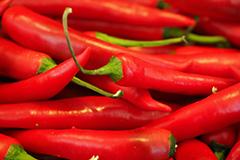 Earlier we talked about how menthol triggers cold-sensitive receptors that can be beneficial for getting rid of congestion. Chilli peppers contain an active ingredient called capsaicin, which works in a similar manner to menthol, except instead of triggering cold-sensitive receptors it affects heat-sensitive ones.
Earlier we talked about how menthol triggers cold-sensitive receptors that can be beneficial for getting rid of congestion. Chilli peppers contain an active ingredient called capsaicin, which works in a similar manner to menthol, except instead of triggering cold-sensitive receptors it affects heat-sensitive ones.
By stimulating these receptors, you can help loosen the build-up of mucus and phlegm by thinning it, after which it can be more easily removed from your body. There are plenty of different foods that you can begin to incorporate into your diet which may help to relieve congestion, and you can pick and choose which ones you want to try based on your preferred tastes and flavours. Try some of the following and see if they help:
- Horseradish
- Black pepper
- Curry
- Mustard
If you struggle with spicier foods, you can always start to add small amounts of spices like chilli flakes or turmeric to your regular meals, as a means of ensuring you receive some form of capsaicin intake. By doing this, you can tailor the amount you use to your dietary habits, meaning that you never have to force yourself to eat something you don't enjoy, all the while enjoying the decongestant properties they can exhibit.
Make Sure You're Getting Enough Vitamin C
The act of producing mucus and phlegm is just one example of how your immune system can try and defend your body against harmful toxins, microbes and chemicals. A good way of relieving congestion is to try and improve the overall health of your immune system against respiratory infections to prevent the need for excess mucus and phlegm production to occur in the first place. Vitamin C is a particularly popular vitamin that is renowned across the globe for its ability to help reinforce your immune system and protect against oxidative stress caused by harmful free-radical molecules.
The European Food Safety Authority (EFSA) has authorised the claim that “vitamin C contributes to the normal function of the immune system”, meaning that if you're looking to help get rid of congestion, ensuring your body receives a consistent dose of vitamin C is a good place to start. A study in 2006 looked to explore the immune-enhancing role of vitamin C and zinc.
A large randomised sample of participants was used, who were given controlled trials that included doses of 1g of vitamin C and up to 30mg of zinc, which were administered in clinical conditions. The study found that vitamin C could “ameliorate symptoms and shorten the duration of respiratory tract infections including the common the cold.”
Thankfully, vitamin C is also a very abundant nutrient that can be found in a variety of different fruits, meaning that you have plenty of opportunities to make sure your body receives a good dose on a day-to-day basis. Snacking on apples, oranges, mango, strawberries and watermelon are just a few examples of the things you can be eating to help get rid of congestion.
Use Garlic
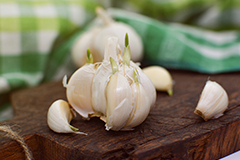 Garlic is a popular home remedy that is frequently cited by many as an effective way of helping to get rid of congestion. Just smelling a clove of garlic will give you an indication of the potential benefits it can exhibit, because the cool, powerful and refreshing aroma is also caused by the compound that gives garlic its immunity-boosting reputation.
Garlic is a popular home remedy that is frequently cited by many as an effective way of helping to get rid of congestion. Just smelling a clove of garlic will give you an indication of the potential benefits it can exhibit, because the cool, powerful and refreshing aroma is also caused by the compound that gives garlic its immunity-boosting reputation.
When garlic is sliced or crushed, enzymes convert a sulfoxide called Alliin into Allicin, a compound that is believed to be able to help combat common respiratory infections and assist with decongesting efforts.
A 2001 study investigated whether garlic supplements could help prevent the common cold. The study used 146 volunteers who randomly received either a garlic supplement that contained allicin or a placebo. One capsule was given daily and the study ran for 12 weeks from November to February. The study reported that those who received the active treatment suffered less colds than the placebo, whereas those who received the placebo reported that their symptoms lasted for over five days. The study concluded that “an allicin-containing supplement can prevent attack by the common cold virus.”
Although the study of allicin and its effectiveness in helping to boost your immune function is relatively lacking, the above mentioned experiment, alongside another review published in 1999 which stated that “allicin, one of the active principles of freshly crushed garlic homogenates, has a variety of antimicrobial activities” , are promising signs for the future.
As a decongestant, you can use garlic alongside hot water to make steam that, when inhaled, may help combat sinus infections and mucus build-up to clear nasal passages. Just be sure not to make the water too hot because, like we discussed earlier in the article, it could burn these passages. The antibacterial properties of allicin may also be enjoyed in a daily supplement, or by incorporating garlic into your diet.
Adjust Your Sleep Routine
In order to help make sure that your body is in the best condition to combat symptoms of congestion, you need to make sure that you not only get enough sleep, but that your sleeping routine is also best suited to influence recovery as well.
Firstly, you can help promote decongestant efforts by adding an extra pillow to make sure that your head is properly elevated when you sleep. Lying flat may cause your passageways to become blocked, so propping yourself up may help you to get a better night's sleep.
We talked about the potential benefits humidifiers and vaporisers can offer against congestion, so adding one to your bedroom to add warmth and moisture might be able to help optimise your sleeping environment. Like we mentioned earlier in the article, dry air can often cause your sinuses to become irritated, increasing the production of mucus and phlegm, thus adding to your problem of congestion. Countering this effect during your much-needed sleep is extremely beneficial.
Nasal sleep strips can also be purchased at most supermarkets and used to help widen the size of your nasal passages when you sleep. These strips work by sticking to your nose above your nostrils with an adhesive glue. As the strips try to return to their original straight shape, they pull on your nasal passages and make them wider, allowing for greater airflow to occur as well as promoting decongestion. If you find that you particularly struggle with a blocked, stuffy nose during the night, you might find these to be a useful addition your nightly sleeping habits.
The Rest Is in Your Hands
By incorporating some of these suggestions into your day-to-day routine, you may be able to help relieve the congestion you're suffering from. However, long term congestion could be the sign of a more serious health complication that will need addressing. If you're ever unsure, or would like more specific advice that's tailored to your individual health requirements, be sure to talk to your local GP or pharmacist to be on the safe side.
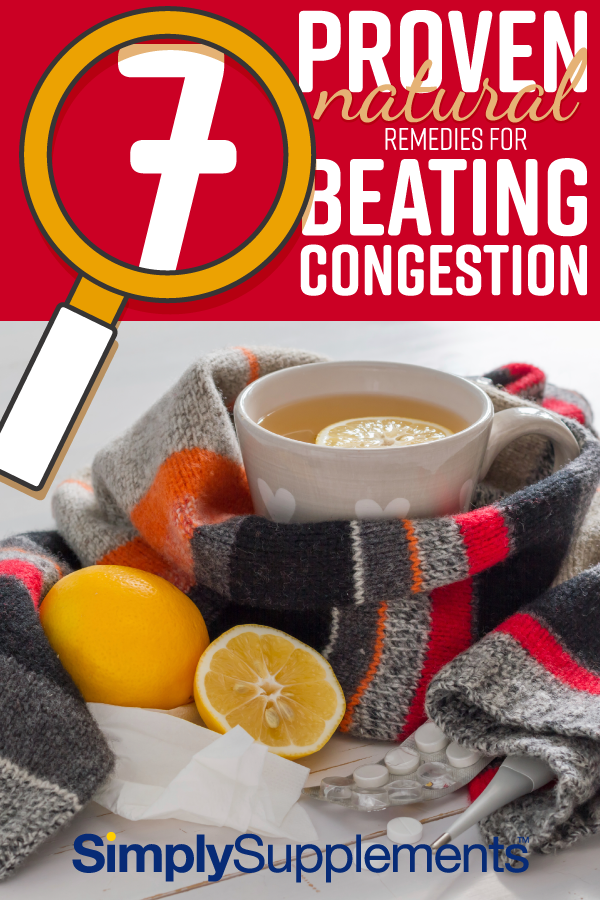
Sources:
https://www.karger.com/Article/Abstract/90495
https://www.ncbi.nlm.nih.gov/pubmed/11697022
https://www.sciencedirect.com/science/article/pii/S1286457999800033

 Nicole
Nicole 